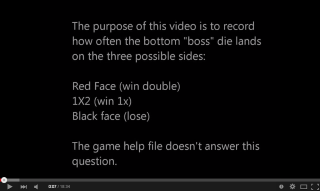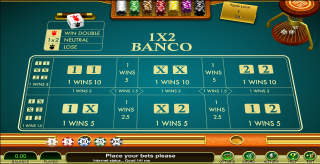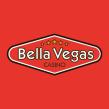On this page
1X2 Banco
On this page
Introduction
Although the rules may look complicated at first, this is actually a pretty simple dice game. Two of the dice have only three possible outcomes — a 1, 2, or X. There are a host of bets on the six possible outcomes between the two dice — 1-1, 2-2, X-X, 1-2, 1-X, and 2-X. The third die acts as a multiplier on any win of either 0x, 1x, or 2x.
The game was developed by Amigotechs, which supplies software to Internet casinos. Please be advised that Amigotechs is on our online casino blacklist for alleged non-random game results.
 Ohio Recommended Online Casinos
View All
Ohio Recommended Online Casinos
View All
Rules
This game is a bit hard to explain, so read carefully.
- The game uses three six-sided dice.
- Two of them are numbered with a 1, 2, and X — Each on two faces.
- The third die, called the "boss," serves as a multiplier for any win. The possible multiples are 0, 1, and 2. The distribution of said multipliers is not stated in the help file. However, I submit evidence later that the distribution of the six sides is as follows:
- Multiplier of 0 (loss): 2 sides.
- Multiplier of 1 (win remains the same): 3 sides.
- Multiplier of 2 (win doubles): 1 side.
- There are a host of bets available on the other two dice. I've had to create some of my own terminology to explain them. The bets (before applying the multiplier) are as follows:
- 1-1 Pays 10 to 1.
- 2-2 Pays 10 to 1.
- X-X Pays 10 to 1.
- 1-2 Pays 5 to 1.
- 1-X Pays 5 to 1.
- 2-X Pays 5 to 1.
- 1-1 or X-X: 5 to 1.
- 1-1 or 1-2: 3 to 1.
- 2-2 or X-X: 5 to 1.
- 2-2 or 1-2: 3 to 1.
- 1-1 or 1-X: 3 to 1.
- X-X or X-2: 3 to 1.
- 1-1, 2-2, or X-X: pays 3 to 1.
- 1-X or 2-X: pays 5 to 2.
- 1-2 or 2-X: pays 5 to 2.
- 1-2, 1-X, or 2-X: pays 3 to 2.
The Boss Die
The big mystery with this game is the distribution of the possible outcomes of the "boss" multiplier die. There are clearly six faces on the die. In the world of Internet gambling, where there are essentially no rules, that doesn't mean that each side has an equal chance, but it would be nice if the game could be replicated in the real world.
The rules do say that there are three possible outcomes, as follows:
- Red happy face: Any win is doubled.
- 1X2: Neutral. Any win remains the same.
- Black sad face: Any win is lost.
I asked support at Skybook casino about how many times each symbol was on the Boss die. Here is the transcript of the conversation, if you're interested:
- Jonathan Mora has joined the chat.
- Jonathan Mora (09:09:32) : Hello.Thank you for contacting customer service, how can I help you?
- Mike (09:09:51) : Good morning. I have a question about the rules of 1x2 Banco.
- Jonathan Mora (09:10:41) : May I have your username and password please
- Mike (09:11:01) : Editorial note: User name and password provided, although I still don't see why I had to if I just had a question about the game rules. This is a common annoyance of mine with online casino support anywhere.
- Jonathan Mora (09:12:48) : thank you
- Mike (09:13:10) : May I ask my question now?
- Jonathan Mora (09:13:16) : go ahead
- Mike (09:14:00) : The "boss" die can either be a happy face, sad face, or "1x2." My question is what the chances that die lands on each symbol?
- Jonathan Mora (09:16:23) : sorry, is this Bingo, casino??
- Jonathan Mora (09:16:30) : I only handle sports
- Mike (09:17:02) : I'm a player of the Sky Book casino.
- Jonathan Mora (09:17:09) : oh casino, ok
- Jonathan Mora (09:17:14) : one moment please
Transferring chat to Samael Tula.
Connecting... - Samael Tula has joined the chat.
- Samael Tula (09:18:41) : Hello Mike
- Mike (09:18:54) : Hello. Have you read my question?
- Samael Tula (09:19:25) : I have
- Samael Tula (09:19:40) : however, I'm not sure I do understand what you meant to ask
- Mike (09:20:50) : In the game 1x2 Banco, there is a multiplier die called the "boss." It has only three possible outcomes: win, lose, or win double. However, the die has six sides. My question, what are the chances the die lands on each outcome?
- Samael Tula (09:21:21) : perhaps you have another account, in this one (SK17140) you do not show any action.
- Samael Tula (09:21:24) : I see..
- Samael Tula (09:23:10) : that's kind of an easy calculation...
- Samael Tula (09:23:56) : the probability is the same in every iteration
- Samael Tula (09:24:27) : 1 out of six, which is 16%
- Mike (09:25:40) : So, the die has six sides and three possible outcomes. Can you tell me how many times each symbol appears on the die. For example, each one appears twice.
- Samael Tula (09:26:56) : I'm sorry, I can't answer that question. Since the game is random, all of the possibilities may show
- Mike (09:28:01) : I understand that the game is random. With a regular die, we could truthfully say that each number has a 1/6 chance. Can you make any such statements with the 1x2 Banco die?
- Samael Tula (09:29:03) : yes
- Mike (09:29:18) : So, what statement can you make about it?
- Samael Tula (09:30:21) : each number has the same probability of occurrence
- Mike (09:30:36) : May I ask how you know this?
- Samael Tula (09:30:55) : it's basic statistics
- Mike (09:31:53) : What if the die was like this: 1 side was win double, 1 side was win, and 4 sides were lose. Then would each outcome have the same chance?
- Samael Tula (09:31:58) : based upon the fact that the game is random, and the next iteration does not depend on the previous one
- Samael Tula (09:32:29) : you are exactly right
- Mike (09:33:03) : What am I exactly right about?
- Samael Tula (09:33:16) : each outcome have the same chance Mike (09:33:55) : So, you're saying that "win double" is 33 1/3%, "win" is 33 1/3%, and "lose" is 33 1/3%?
- Samael Tula (09:34:11) : no
- Samael Tula (09:34:18) : win double is 1/6
- Samael Tula (09:34:25) : win is 1/6
- Samael Tula (09:34:45) : and lose, is a summary of the other probabilities
- Samael Tula (09:35:01) : that is 0.66 or 66%
- Mike (09:35:09) : So lose is 4/6. It is just a coincidence that my example was right?
- Samael Tula (09:35:25) : it is not coincidence, it's logical
- Mike (09:36:46) : Why isn't it just as logical that that faces are: Lose = 1, Win = 1, Win double = 4.
- Samael Tula (09:37:34) : win double = 1, win = 1 lose = 4
- Mike (09:37:58) : I appreciate the answer, but I don't know how it is logical to conclude that.
- Samael Tula (09:40:57) : that's a good question and the only reasonable answer is: that's what the law of probabilities state
- Samael Tula (09:41:51) : provided the game is random and each iteration does not depend on the previous one and does not have any incidence on the following one
- Mike (09:43:26) : I don't see how that is so obvious to conclude that. I am writing an article about this game. So, I may take it as fact that the sides of the die are: win = 1, win double = 1, lose = 4. I will be copying and pasting this transcript in my article so I would like to give you the opportunity to add any additional information you wish or correct anything I said that is in error.
- Samael Tula (09:45:11) : I do not have anything else to add and wish you the best in the writing of your article Mike (09:45:48) : Thank you for your time then.
- Samael Tula (09:46:09) : all I can add is that my statement is based upon knowledge, not only for having been in this industry for a few years but also for having a degree in statistics
- Samael Tula (09:46:13) : you are very welcome

With all due respect to Samael's [sic] degree in statistics, I was skeptical. Not only would it make this game an awful bet, but it didn't fit in with what I had observed with 227 recorded hands of previous play. So, I created this video of 198 hands of play. Following are the results of the video:
Video Summary
| Face | Observations |
|---|---|
| Win double | 36 |
| Neutral | 106 |
| Lose | 56 |
| Total | 198 |
As you can see at the end of the video, I compared these results to the configuration of the die claimed by Samael. Following are the results of a chi-squared test:
- chi-squared statistic = 205.52.
- Degrees of freedom = 2
- p value = 2.36022 × 10-45
In other words, the probability of results this skewed or more are 1 in 423,689,913,582,098,000,000,000,000,000,000,000,000,000,000.
Based on what I observed, I think a more likely configuration of the die is 1 side is win double (we agree on that), 2 are lose, and 3 are neutral.
Here would be the results of a chi-squared test of that hypothesis:
- chi-squared statistic = 2.28.
- Degrees of freedom = 2
- p value = 31.96%
In other words, about 32% of the time you would expect results more skewed and 68% less.
However, it would be brash of me to say that Samael, working for the casino offering the game, and with a degree in statistics, is incorrect. So, let's analyze the game both ways. Out of respect, I'll present Samael's rules first. Wins are expressed on a "for one" basis in the game, which is how I shall do so also. You can decide for yourself who to believe.
Analysis — Samael Rules
All the tables in this section are predicated on a Boss die with the following distribution of sides: Win double (1 side), Neutral (1 side), Lose (4 sides).
The following table shows the possible outcome of any of the bets on a specific hard way. In particular, the bets on a 1-1, 2-2, and X-X. The lower right cell shows a return of 55.56%. In other words, a house edge of 44.44%.
One Hard Way
| Outcome | Pays | Probability | Return |
|---|---|---|---|
| Win double | 20 | 0.018519 | 0.370370 |
| Neutral | 10 | 0.018519 | 0.185185 |
| Loss | 0 | 0.962963 | 0.000000 |
| Total | 1.000000 | 0.555556 |
The following table shows the possible outcome of any of the bets on a specific easy way. In particular, the bets on a 1-2, 2-X, and 1-X. The lower right cell shows a return of 55.56%. In other words, a house edge of 44.44%.
One Easy Way
| Outcome | Pays | Probability | Return |
|---|---|---|---|
| Win double | 10 | 0.037037 | 0.370370 |
| Neutral | 5 | 0.037037 | 0.185185 |
| Loss | 0 | 0.925926 | 0.000000 |
| Total | 1.000000 | 0.555556 |
The following table shows the possible outcome of any of the bets on one of two specified hard ways. In particular, the bets on (1) 1-1 or 2-2, (2) 1-1 or X-X, or (3) 2-2 or X-X. The lower right cell shows a return of 55.56%. In other words, a house edge of 44.44%.
Two Hard Ways
| Outcome | Pays | Probability | Return |
|---|---|---|---|
| Win double | 10 | 0.037037 | 0.370370 |
| Neutral | 5 | 0.037037 | 0.185185 |
| Loss | 0 | 0.925926 | 0.000000 |
| Total | 1.000000 | 0.555556 |
The following table shows the possible outcome of any of the bets that include one hard way and one easy way. In particular, the bets on (1) 1-1 or 1-X, (2) 2-2 or 1-2, or (3) X-X or X-2. The lower right cell shows a return of 50.00%. In other words, a house edge of 50.00%.
One Hard Way and One Easy Way
| Outcome | Pays | Probability | Return |
|---|---|---|---|
| Win double | 6 | 0.055556 | 0.333333 |
| Neutral | 3 | 0.055556 | 0.166667 |
| Loss | 0 | 0.888889 | 0.000000 |
| Total | 1.000000 | 0.500000 |
The next table shows the possible outcomes of the bet on any hard way. In other words, this is a bet on a 1-1, 2-2, or X-X. The lower right cell shows a return of 50.00%. In other words, a house edge of 50.00%.
Any Hard Way
| Outcome | Pays | Probability | Return |
|---|---|---|---|
| Win double | 6 | 0.055556 | 0.333333 |
| Neutral | 3 | 0.055556 | 0.166667 |
| Loss | 0 | 0.888889 | 0.000000 |
| Total | 1.000000 | 0.500000 |
The next table shows the possible outcomes of the bet on two specified easy ways. In other words, this is a bet on either (1) 1-X or 2-X or (2) 1-2 or 2-X. The lower right cell shows a return of 50.00%. In other words, a house edge of 50.00%.
| Outcome | Pays | Probability | Return |
|---|---|---|---|
| Win double | 5 | 0.074074 | 0.370370 |
| Neutral | 2.5 | 0.074074 | 0.185185 |
| Loss | 0 | 0.851852 | 0.000000 |
| Total | 1.000000 | 0.555556 |
The next table shows the possible outcomes of the bet on any easy way. In other words, this is a bet on a 1-1, 2-2, or X-X. The lower right cell shows a return of 50.00%. In other words, a house edge of 50.00%.
Any Easy Way
| Outcome | Pays | Probability | Return |
|---|---|---|---|
| Win double | 3 | 0.111111 | 0.333333 |
| Neutral | 1.5 | 0.111111 | 0.166667 |
| Loss | 0 | 0.777778 | 0.000000 |
| Total | 1.000000 | 0.500000 |
So, under the Samael rules, the house edge ranges from 44.44% to 50%.
Next, let's see how they look under what I'll call the "Wizard" rules.
Analysis — Wizard Rules
All the tables in this section are predicated on a Boss die with the following distribution of sides: Win double (1 side), Neutral (3 sides), Lose (2 sides).
The following table shows the possible outcome of any of the bets on a specific hard way. In particular, the bets on a 1-1, 2-2, and X-X. The lower right cell shows a return of 92.59%. In other words, a house edge of 7.41%.
One Hard Way
| Outcome | Pays | Probability | Return |
|---|---|---|---|
| Win double | 20 | 0.018519 | 0.370370 |
| Neutral | 10 | 0.055556 | 0.555556 |
| Loss | 0 | 0.925926 | 0.000000 |
| Total | 1.000000 | 0.925926 |
The following table shows the possible outcome of any of the bets on a specific easy way. In particular, the bets on a 1-2, 2-X, and 1-X. The lower right cell shows a return of 92.59%. In other words, a house edge of 7.41%.
One Easy Way
| Outcome | Pays | Probability | Return |
|---|---|---|---|
| Win double | 10 | 0.037037 | 0.370370 |
| Neutral | 5 | 0.111111 | 0.555556 |
| Loss | 0 | 0.851852 | 0.000000 |
| Total | 1.000000 | 0.925926 |
The following table shows the possible outcome of any of the bets on one of two specified hard ways. In particular, the bets on (1) 1-1 or 2-2, (2) 1-1 or X-X, or (3) 2-2 or X-X. The lower right cell shows a return of 92.59%. In other words, a house edge of 7.41%.
Two Hard Ways
| Outcome | Pays | Probability | Return |
|---|---|---|---|
| Win double | 10 | 0.037037 | 0.370370 |
| Neutral | 5 | 0.111111 | 0.555556 |
| Loss | 0 | 0.851852 | 0.000000 |
| Total | 1.000000 | 0.925926 |
The following table shows the possible outcome of any of the bets that include one hard way and one easy way. In particular, the bets on (1) 1-1 or 1-X, (2) 2-2 or 1-2, or (3) X-X or X-2. The lower right cell shows a return of 83.33%. In other words, a house edge of 16.67%.
One Hard Way and One Easy Way
| Outcome | Pays | Probability | Return |
|---|---|---|---|
| Win double | 6 | 0.055556 | 0.333333 |
| Neutral | 3 | 0.166667 | 0.500000 |
| Loss | 0 | 0.777778 | 0.000000 |
| Total | 1.000000 | 0.833333 |
The next table shows the possible outcomes of the bet on any hard way. In other words, this is a bet on a 1-1, 2-2, or X-X. The lower right cell shows a return of 83.33%. In other words, a house edge of 16.67%.
Any Hard Way
| Outcome | Pays | Probability | Return |
|---|---|---|---|
| Win double | 6 | 0.055556 | 0.333333 |
| Neutral | 3 | 0.166667 | 0.500000 |
| Loss | 0 | 0.777778 | 0.000000 |
| Total | 1.000000 | 0.833333 |
The next table shows the possible outcomes of the bet on two specified easy ways. In other words, this is a bet on either (1) 1-X or 2-X or (2) 1-2 or 2-X. The lower right cell shows a return of 92.59%. In other words, a house edge of 7.41%.
| Outcome | Pays | Probability | Return |
|---|---|---|---|
| Win double | 5 | 0.074074 | 0.370370 |
| Neutral | 2.5 | 0.222222 | 0.555556 |
| Loss | 0 | 0.703704 | 0.000000 |
| Total | 1.000000 | 0.925926 |
The next table shows the possible outcomes of the bet on any easy way. In other words, this is a bet on a 1-1, 2-2, or X-X. The lower right cell shows a return of 83.33%. In other words, a house edge of 16.67%.
Any Easy Way
| Outcome | Pays | Probability | Return |
|---|---|---|---|
| Win double | 3 | 0.111111 | 0.333333 |
| Neutral | 1.5 | 0.333333 | 0.500000 |
| Loss | 0 | 0.555556 | 0.000000 |
| Total | 1.000000 | 0.833333 |
Online Craps Casino Bonuses View All
Bonus Code
Same for Blackjack
- 60 times on Slots
- 120 times on Poker, Roulette
- 240 times on Baccarat
- 600 times on Video Poker








